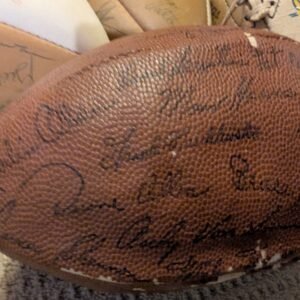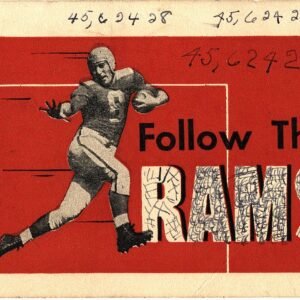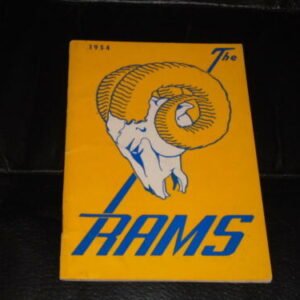The 1998 St. Louis Rams season was one of continued transition for the franchise as it sought to establish itself in its new home. The Rams finished the 1998 season with a 4-12 record, marking another disappointing year as they struggled in the NFC West. While the team had some bright spots, it was clear that the franchise was still in the process of rebuilding, with key areas still needing improvement.












Record: 4-12
The Rams’ 4-12 finish in 1998 was another step back in their effort to become competitive in the NFL. The team faced numerous challenges throughout the season, including a lack of consistency on both offense and defense. While there were a few positive moments and individual performances that offered hope, the Rams’ struggles were evident, and the team failed to break through in the highly competitive NFC West.
Head Coach: Dick Vermeil
After Rich Brooks was fired following the 1997 season, the Rams hired Dick Vermeil as the team’s head coach in 1997. Vermeil, a seasoned coach with a reputation for rebuilding teams, was tasked with turning the Rams around. However, despite his leadership, the team still faced significant growing pains in 1998. Vermeil was known for his focus on hard work and discipline, and while he had some success in the future, the 1998 season was part of a longer rebuilding process.
Quarterback Play
Quarterback play continued to be a significant issue for the Rams. Tony Banks, who had shown flashes of potential in 1997, was the team’s starting quarterback in 1998. However, his performance was inconsistent, and his struggles to lead the offense were a major factor in the team’s lack of success. Banks finished the season with 2,230 passing yards, 9 touchdowns, and 22 interceptions, demonstrating his difficulty in protecting the ball and being a consistent presence under center.
The Rams also gave Chris Miller, the veteran quarterback, some playing time, but he, too, had trouble finding success. The team’s inability to find a steady and reliable quarterback was one of the key reasons for their struggles throughout the season. With a revolving door at the quarterback position, the Rams lacked the stability needed to compete at a high level.
Offensive Struggles
The offensive unit was another area where the Rams continued to face issues. While the team had some individual talent, such as Isaac Bruce, the offense as a whole lacked the consistency to move the ball effectively. Troy Davis, who had rushed for almost 1,000 yards in 1997, remained the team’s primary running back, but he didn’t have the same level of success in 1998. Davis rushed for 623 yards and 4 touchdowns, but his production was hampered by poor offensive line play and a lack of a consistent passing attack to complement his efforts.
Bruce, the team’s star wide receiver, remained the most reliable target in the passing game. He finished the season with 69 receptions for 1,065 yards and 3 touchdowns, showcasing his ability to produce even in a struggling offense. However, aside from Bruce, the Rams didn’t have many reliable weapons in the passing game. Tight ends and other wide receivers struggled to step up, and the team’s inability to establish a potent passing game left the offense stagnant.
The offensive line also struggled, failing to provide adequate protection for the quarterbacks and opening holes for the running backs. The Rams’ inability to establish a balanced attack made them one-dimensional and easier to defend.
Defensive Struggles
On the defensive side, the 1998 Rams faced many of the same issues that plagued the team in previous years. The defense allowed too many points, with opponents frequently able to move the ball at will against St. Louis. Kevin Greene, the linebacker, continued to be one of the team’s defensive stars, but he was getting older, and the defense as a whole lacked playmakers to make a significant impact.
The Rams had some talented individual players on defense, such as Aeneas Williams and Todd Lyght in the secondary, but they struggled to put together a cohesive and effective defense. The team’s pass rush was inconsistent, and they struggled to defend against both the run and the pass. The Rams’ defense allowed an average of 26.5 points per game, which ranked near the bottom of the league.
Despite the individual talent on defense, the Rams’ lack of consistency in all areas contributed to their struggles. There were moments of solid play, but overall, the defense was unable to consistently stop opposing offenses.
Special Teams
The Rams’ special teams unit had a mixed performance in 1998. Jeff Wilkins, the kicker, remained a reliable presence, converting on 17 of 22 field goals. His consistency helped keep the Rams in games, but special teams did not have a significant impact on the overall success of the team.
Punt and kick returners were unable to provide much of a spark, and the special teams unit as a whole did not generate the game-changing plays that could have shifted momentum in the Rams’ favor.
Looking Ahead:
The 1998 St. Louis Rams were still very much in the rebuilding phase. With a 4-12 record, the team clearly had a long way to go before it could compete with the more established teams in the NFC West. The lack of consistent quarterback play, offensive struggles, and defensive inconsistencies were major obstacles to success.
However, there were signs of hope. Isaac Bruce continued to be one of the league’s top receivers, and the defense, led by veterans like Kevin Greene, had potential to improve. The Rams also had some young talent, such as Tony Banks, who, if developed properly, could become the future leader of the team.
The hiring of Dick Vermeil as head coach was a positive step, as he had the experience to turn a team around. Though the 1998 season was a setback, it set the stage for future improvements. In the coming seasons, the Rams would need to address their quarterback situation and continue building on their defensive and offensive talent to become more competitive in the NFC.
As the 1999 season approached, the Rams had a lot of work to do, but with the right moves, the franchise could soon see the rewards of their rebuilding efforts. The 1998 season was a tough one, but it was part of a longer journey toward future success.




